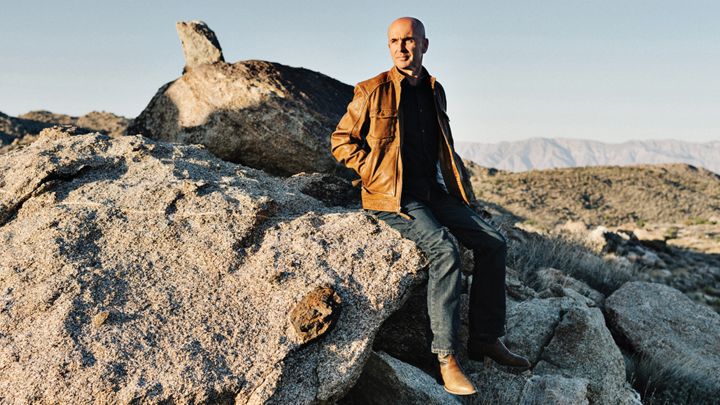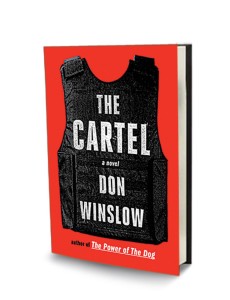The War on Drugs: ‘A Trillion-Dollar Failure’
SPOTLIGHT, ANGLO AMERICA, HEALTH, REVIEWS, 29 Jun 2015
Celebrated crime writer Don Winslow continues his secret history of the War on Drugs in his disturbing and important new novel, ‘The Cartel’.

Don Winslow’s new novel ‘The Cartel’ is a dark (but factual) look at the Mexican drug wars. Jake Stangel
June 25, 2015 – “Listen,” says Don Winslow, “it’s an angry book.” He’s talking about his new novel, The Cartel, a sequel to 2005’s The Power of the Dog. Taken together, the books read as a sort of Game of Thrones of the Mexican drug wars, a multipart, intricately plotted, blood-soaked epic that tells the story of how America’s unquenchable appetite for illegal drugs has brought chaos to our southern neighbors and darkened our own political and criminal culture. Dog, which stretches from the Seventies through the turn of the century, traces the rise of the narcotraficantes who split Mexico into territories and smuggled cocaine across the U.S. border by the ton. The new book picks up the story as the violence increases and spills out into Mexican society, turning cities like Juarez into Fallujah-like battle zones. But the most shocking thing about these books is that almost all the horror stories Winslow tells actually happened. The characters may be fictionalized, but the events are largely true — from the narcotrafficker who threw children off a bridge to a pubescent hit man, as well as countless murders, kidnappings and tortures. “I didn’t want to write The Cartel,” Winslow says. “I didn’t want to go back to that world, and I did it very reluctantly. But then I’m sitting here watching the violence escalate to unimaginable levels and the sadism becomes not only psychopathic but generalized. And I thought, ‘I gotta write about this again.’ ”
I think of these books as not so much crime novels as war novels.
The War on Drugs is a trillion-dollar failure. We spend billions of dollars pursuing drugs and billions imprisoning people that probably shouldn’t be in prison. We have troops in Central America chasing drug dealers, we have Special Forces and Marines. Meanwhile, this war has killed a hundred thousand people in Mexico – and that doesn’t include 22,000 people missing.
And people in this country barely seem to notice.
We’ve become conditioned to go, “Well, Mexico is corrupt, that’s Mexico.” But I would ask the question “What kind of corruption do we have? What kind of corruption do we have in our soul that makes us the world’s largest market for drugs, which is what fuels and funds this violence?”
It almost seems like the War on Terror and the War on Drugs are all part of one big, fruitless conflict.
These ISIS beheadings that we’re seeing, that’s a direct copy of what the cartels were doing in 2007 and 2008, when they were chopping off people’s heads and sending out video clips as tools of intimidation or recruitment. The cartels had become so hip to modern communications that they realized that they were not only fighting a shooting war but that they needed to fight a media and propaganda war as well. And that’s new in the history of organized crime.
I couldn’t understand it until I found out that the Zetas had imported Special Forces veterans from the Guatemalan army, which had fought the “dirty war” in the Nineties against communist insurgents — and one of their things was to cut off heads. So you can literally see the influence come in.
What makes the cartels so effective?
They aren’t in the dope business. They’re in the territory business, they’re in the protection business, they’re in the intimidation business. The product doesn’t really matter as long as it’s illegal in the United States.
One of the most powerful points the book makes is that the War on Drugs might be the defining event of the past few decades, not just for Mexico but also the United States.
I can draw you a direct line between events in Ferguson and Baltimore and Cleveland to the War on Drugs. The hostility between inner-city communities and American police forces begins with the War on Drugs and continues to the point where you get militarized police armed like soldiers, acting like soldiers. So the fruits that we’re reaping now are seeds that were planted back in 1971, when Nixon declared war on drugs.
One reason that we were so quickly able to move into the hypersurveillance state in the War on Terror was because we’ve been practicing it for decades. All those systems are in place. Now the technology has gotten much better, of course.
I assume you must have talked to a lot of people in the DEA world while researching the book?
I’m not gonna name names here, but . . .
What do those guys think of the way you portray their life’s work?
Well, they’re in a revolving door. They might make a large bust or some major arrests, but then eventually that victory is meaningless because there is always gonna be more dope.
They must get pretty cynical.
I think so. But they see the horrors that these cartels perpetrate. So it becomes a very personal kind of war for them. They want to get justice. I completely understand that.
Do you look forward and see any way things get better?
In Tijuana, there have been more than a hundred killings this spring following a relatively peaceful period. So I’m afraid that we’re gonna see another big violent period there now. The new marijuana laws are going to help. But until we have a fundamental change in the way we think about these issues, no, it is not going to get any better. The War on Drugs is more of a problem to the United States than drugs are.
________________________________
Related:
The War on Drugs Is Burning Out
Leading at the ballot box from Alaska to Washington, D.C., Americans are charting a path to a saner national drug policy
From The Archives Issue 1238: July 2, 2015
Go to Original – rollingstone.com
DISCLAIMER: The statements, views and opinions expressed in pieces republished here are solely those of the authors and do not necessarily represent those of TMS. In accordance with title 17 U.S.C. section 107, this material is distributed without profit to those who have expressed a prior interest in receiving the included information for research and educational purposes. TMS has no affiliation whatsoever with the originator of this article nor is TMS endorsed or sponsored by the originator. “GO TO ORIGINAL” links are provided as a convenience to our readers and allow for verification of authenticity. However, as originating pages are often updated by their originating host sites, the versions posted may not match the versions our readers view when clicking the “GO TO ORIGINAL” links. This site contains copyrighted material the use of which has not always been specifically authorized by the copyright owner. We are making such material available in our efforts to advance understanding of environmental, political, human rights, economic, democracy, scientific, and social justice issues, etc. We believe this constitutes a ‘fair use’ of any such copyrighted material as provided for in section 107 of the US Copyright Law. In accordance with Title 17 U.S.C. Section 107, the material on this site is distributed without profit to those who have expressed a prior interest in receiving the included information for research and educational purposes. For more information go to: http://www.law.cornell.edu/uscode/17/107.shtml. If you wish to use copyrighted material from this site for purposes of your own that go beyond ‘fair use’, you must obtain permission from the copyright owner.
Read more
Click here to go to the current weekly digest or pick another article:
SPOTLIGHT:
- Israel Apologists Hasten to Use Bondi Shooting to Attack Anti-Genocide Activists
- Reflecting on the Day the Pacific War Japan/USA Began: Beyond the Elimination of Anti-Military Speeches
- Does Gandhi Still Matter? Yes, and Rajmohan Gandhi Explains Why
ANGLO AMERICA:
- Who’s the Real Outlaw at Sea? Trump’s Tanker Grab or the Houthis’ Anti-Genocide Blockade?
- ‘We Want It Back’: Trump Asserts U.S. Claims to Venezuelan Oil and Land
- Judge, Jury, and Executioner: On U.S. Assassination Policy 1975-2025
HEALTH:
- FDA Orders COVID ‘Vaccine’ Makers Pfizer and Moderna to Warn Public about Heart Damage Risk
- U.S. Terminates Funding for Polio, H.I.V., Malaria and Nutrition Programs Around the World
- Autism, Made in the USA
REVIEWS: